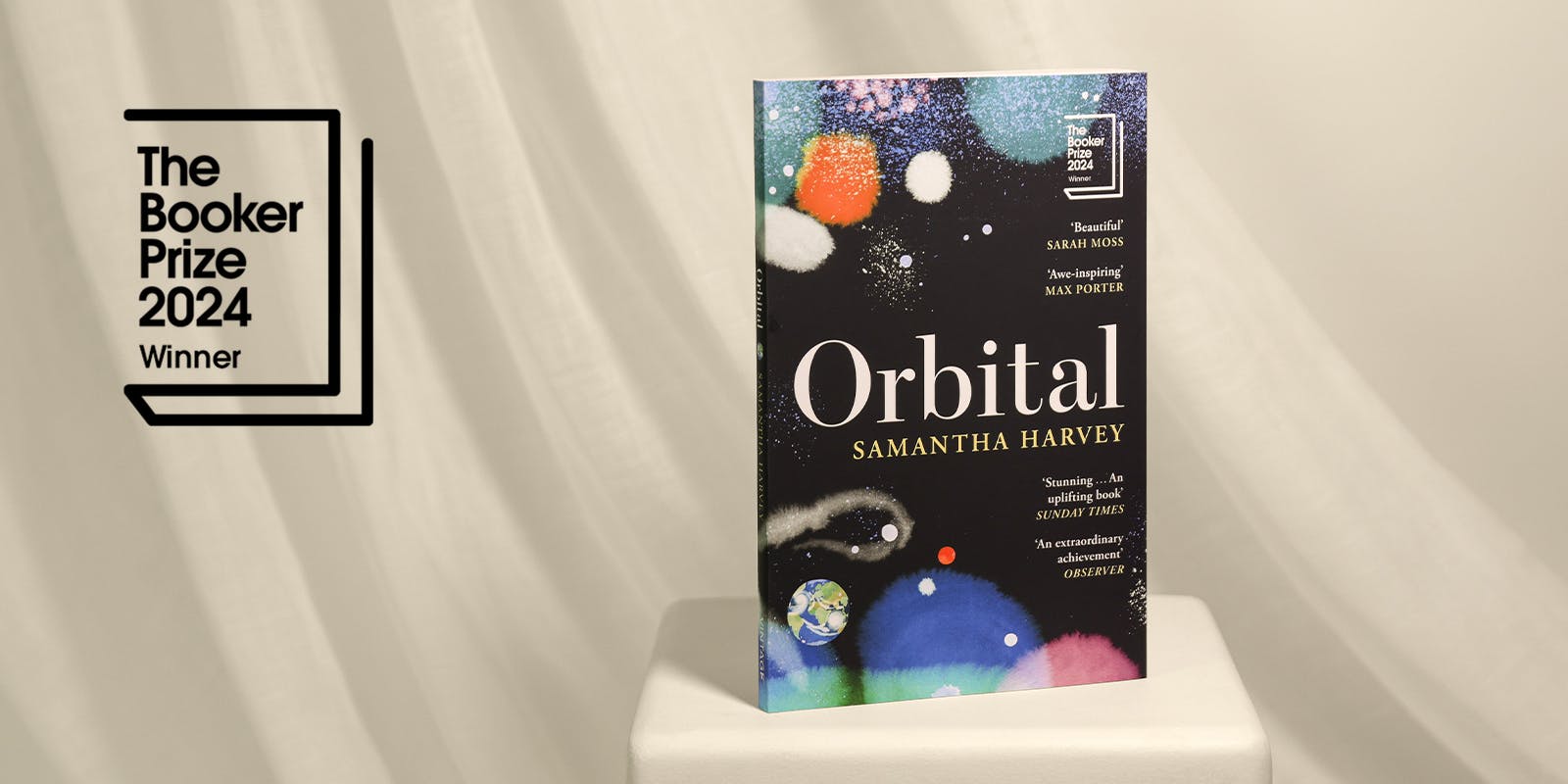Compact yet beautifully expansive, Orbital invites us to observe Earth’s splendour, whilst reflecting on the individual and collective value of every human life.
We’re thrilled to share that Orbital by Samantha Harvey has been named winner of the Booker Prize 2024.

Founded in 1969, the Booker Prize is open to writers worldwide and honours ‘the best sustained work of fiction written in English and published in the UK and Ireland’. To win is a huge honour, not only granting the winning author £50,000 and a trophy, but also the prestige of being named a Booker Prize-winner and exposure to readers around the world.
Samatha Harvey was one of five women on this year’s history-making shortlist, alongside fellow Penguin Random House authors Yael van der Wouden and Rachel Kushner. Harvey’s win marks the first time in five years that a woman has won the prize.
The story takes place over the course of 24 hours, and clocks in at just 136 pages, making it the second-shortest book to ever with the prize. Orbital is also the first Booker Prize-winner ever set in space, and is, in Harvey’s own words ‘space pastoral – a kind of nature writing about the beauty of space.’
Chair of the judges, Edmund de Waal, describes Orbital as ‘a book about a wounded world’, stating that the judging panel’s ‘unanimity about Orbital recognises its beauty and ambition'.
About Orbital

Orbital by Samantha Harvey
Life on our planet as you've never seen it before
A team of astronauts in the International Space Station collect meteorological data, conduct scientific experiments and test the limits of the human body. But mostly they observe. Together they watch their silent blue planet, circling it sixteen times, spinning past continents and cycling through seasons, taking in glaciers and deserts, the peaks of mountains and the swells of oceans. Endless shows of spectacular beauty witnessed in a single day.
Yet although separated from the world they cannot escape its constant pull. News reaches them of the death of a mother, and with it comes thoughts of returning home. They look on as a typhoon gathers over an island and people they love, in awe of its magnificence and fearful of its destruction.
The fragility of human life fills their conversations, their fears, their dreams. So far from earth, they have never felt more part – or protective – of it. They begin to ask, what is life without earth? What is earth without humanity?
Shortlisted for the Booker Prize 2024
We’d also like to extend a huge congratulations to Yael van der Wouden and Rachel Kushner, who made this year’s shortlist for their respective books, The Safekeep and Creation Lake

The Safekeep by Yael van der Wouden
It's fifteen years since the Second World War and the rural Dutch province of Overijssel is quiet. Bomb craters have been filled, buildings reconstructed, and the conflict is well and truly over. Living alone in her late mother's country home, Isabel's life is as it should be: led by routine and discipline. But all is upended when her brother Louis delivers his graceless new girlfriend, Eva, at Isabel's doorstep – as a guest, there to stay for the season . . .
Eva is Isabel's antithesis: she sleeps late, wakes late, walks loudly through the house and touches things she shouldn't. In response Isabel develops a fury-fuelled obsession, and when things start disappearing around the house – a spoon, a knife, a bowl – Isabel's suspicions spiral out of control. In the sweltering heat of summer, Isabel's desperate desire for order transforms into infatuation – leading to a discovery that unravels all she has ever known. The war might not be well and truly over after all, and neither Eva – nor the house – are what they seem.

Creation Lake by Rachel Kushner
Seductive and cunning American spy-for-hire Sadie Smith has been sent by her mysterious but powerful employers to a remote corner of France.
Her mission: to infiltrate a commune of radical eco-activists influenced by the beliefs of an enigmatic elder, Bruno Lacombe, who has rejected civilisation, lives in a Neanderthal cave, and believes the path to enlightenment is a return to primitivism.
Sadie casts her cynical eye over this region of ancient farms and sleepy villages, and finds Bruno’s idealism laughable, but just as she is certain she’s the seductress and puppet master of those she surveils, Bruno Lacombe is seducing her with his ingenious counter-histories, his artful laments, his own tragic story.
Beneath this taut, dazzling story of espionage and intrigue lies one of a woman caught in the crossfire between the past and the future, and a profound treatise on human history.







.jpg?w=690&h=344)





